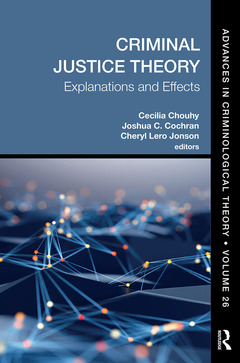Criminal Justice Theory, Volume 26 Explanations and Effects Advances in Criminological Theory Series

Criminal Justice Theory: Explanations and Effects undertakes a systematic study of theories of the criminal justice system, which historically have received very little attention from scholars. This is a glaring omission given the risk of mass imprisonment, the increasing presence of police in inner-city communities, and the emergence of new policy initiatives aimed at improving the quality and effectiveness of the administration of justice. Fortunately, however, a number of disparate theoretical works have appeared that seek to provide insight into the nature and impact of criminal justice. Based on 13 original essays by influential scholars, this volume pulls together the most significant of these perspectives, thus creating a state-of-the-art assessment of contemporary criminal justice theory.
Criminal justice theory can be divided into two main categories. The first includes works that seek to explain the operation of the criminal justice system. Most of these contributions have grappled with the core reality of American criminal justice: its rising embrace of punitiveness and the growth of mass imprisonment. The second category focuses on works that identify theories that have often guided efforts to reduce crime. The issue here focuses mainly on the effects of certain theoretically guided criminal justice interventions. The current volume is thus organized into these two categories: explanations and effects.
The result is an innovative and comprehensive book that not only serves researchers by advancing scholarship but also is appropriate for advanced undergraduate or graduate classroom use.
PART I. Explanation; 1. Foucault and the Power of Criminal Justice: Discipline and Punish Forty Years On; 2. The Culture of Control Revisited; 3. Governing Through Crime in Retrospect; 4. Group Threat and Social Control: A Review of Theory and Research; 5. Theories of Mass Imprisonment; 6. Mass Probation Across the U.S.; 7. Race, Politics, and the Criminalizing of Juvenile Justice: Changing Conceptions of Adolescents’ Competence and Culpability; PART II. Effects; 8. Coercive Mobility Theory in an Era of Declining Prison Populations; 9. Procedural Justice: In Theory and Practice; 10. Broken Windows, Hot Sports, and Focused Deterrence: The State and Impact of the “Big Three” in Policing Innovations; 11. The Saints and the Roughnecks Revisited: Does Labeling Kids Create Criminals; 12. Restorative Justice and Reintegrative Shaming; 13. Rehabilitation and Redemption: Building a New Corrections
Cecilia Chouhy is an Assistant Professor in the College of Criminology and Criminal Justice at Florida State University.
Joshua C. Cochran is an Assistant Professor in the School of Criminal Justice at the University of Cincinnati.
Cheryl Lero Jonson is an Associate Professor in the Department of Criminal Justice at Xavier University.
Date de parution : 06-2021
15.2x22.9 cm
Date de parution : 02-2020
15.2x22.9 cm
Thème de Criminal Justice Theory, Volume 26 :
Mots-clés :
Group Threat Perspective; mass imprisonment; Perceived Victimization Risk; culture of control; Young Men; racial threat; RNR Model; rehabilitative ideal; Hispanic Composition; broken windows policing; Vice Versa; procedural justice; Allocative Process; restorative justice; redemption; Crime Control Field; Managerial Control States; Hot Spots Policing; Criminal Justice Theorizing; National Crime Victimization Survey Data; Reintegrative Shaming; Coercive Mobility; Focused Deterrence; BJS Data; Juvenile Courts; Treatment Hot Spots; Supervision Rates; Disproportionate Minority Contact; Good Life



